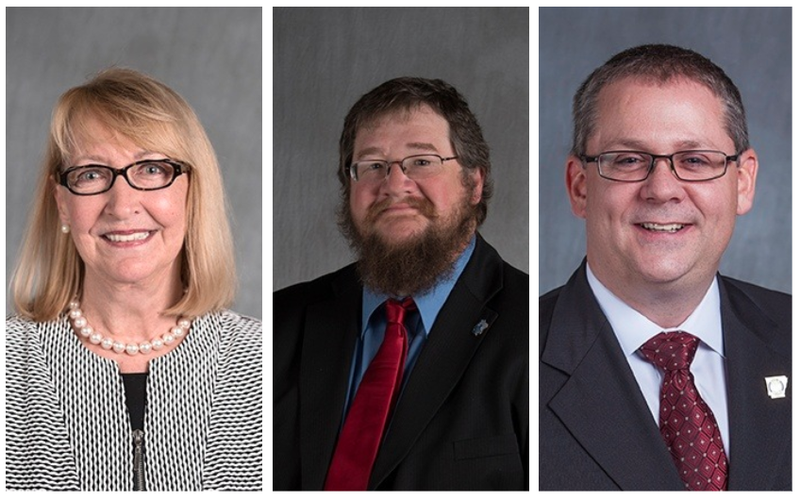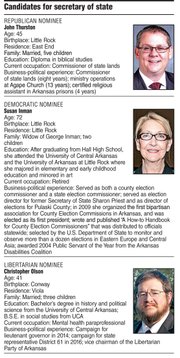The Republican and Democrat vying to be Arkansas' next secretary of state both tout their experience -- the difference lies in the nature of each's past work.
Susan Inman, the Democrat, has two decades of experience overseeing elections, including stints as the state director of elections and as a state and county election commissioner.
Current Commissioner of State Lands John Thurston, the Republican, has for the past eight years run a constitutional office, overseeing a $40 million budget and a staff of about 40.
While both candidates have proposals for each of the office's core functions -- elections, business registration and overseeing the state Capitol grounds -- Inman emphasizes the elections division while Thurston discusses the office more holistically.
Inman's primary campaign platform has been election changes that include automatic voter registration and voting by mail. Those issues would require legislative action, which Inman said she'd lobby for if elected.
"I'm the only candidate in this race who has overseen elections," Inman said. "And I have overseen hundreds of elections and the tabulation of millions of ballots. I'm ready to move Arkansas forward by modernizing voter registration and moving us to a vote-by-mail state to save taxpayer dollars, not waste them."
Thurston has said his focus will be on ensuring secure and accurate elections in coordination with county clerks and election commissions. He has said he opposes the changes proposed by Inman because of security concerns.
Thurston said his experience at the helm of the land commissioner's office makes him the best candidate for the job.
"I'm the only candidate that's successfully run a constitutional state office," Thurston said. "I know how to manage a team. I know how to develop a business mode, implement controls, systems and procedures. I know how to develop a culture within an office that encourages productivity."
The race, which also includes Libertarian Christopher Olson, concludes on Election Day, Nov. 6. Early voting began Oct. 22.
The winning candidate will replace Republican Secretary of State Mark Martin, who is term-limited.
In addition to running the office, the next secretary of state will sit on the Board of Apportionment, which also includes the governor and attorney general. The board redraws state legislative lines after the U.S. Census every 10 years.
Thurston, 45, of East End was first elected state land commissioner in 2010 and was re-elected in 2014. Facing a term limit in that office, Thurston said he decided to run for secretary of state for the same reason he sought the land commissioner's office in 2010 -- public service.
"I feel like I have more to offer the state, having been newly elected in 2010 and having served now eight years, I can tell you you are very green when you are newly elected," Thurston said. "I feel like what I've learned and the relationships I've built have equipped me to run a larger office like the secretary of state. I'm not in this to build a party, build my name or warm a seat. I'm in this to serve."
Inman, 72, of Little Rock is retired. She worked as the state elections director under then-Secretary of State Sharon Priest and as the Pulaski County election director. She was also a member of the Arkansas Election Commission and Pulaski County Election Commission.
Inman has monitored more than a dozen elections in eastern Europe and central Asia for the U.S. Department of State.
She's running, partly, to help boost voter turnout, which she wants to address through her two policy platforms.
"We need more people to participate," Inman said. "We need to modernize our voter registration methods and systems, and right away I'll say, we need to move to vote by mail."
Thurston argues that all-mail voting sacrifices security, and he said it could decrease voter turnout. Thurston also noted that Arkansans can already vote by mail through the absentee voting process.
Currently, three states use across-the-board mail voting for all elections -- Colorado, Oregon and Washington. Academic research has generally found that mail voting increases voter participation, particularly right after its implemented, but there's also research that shows it can decrease turnout if implemented poorly.
A study published in 2011 in the Election Law Journal found that all-mail voting can decrease turnout because it gives voters a longer voting period, decreasing the urgency to vote. The effect, though, can be negated if election officials are vigilant about reminding voters of the election, the research found.
Voting by mail can drastically boost voter participation in special elections when voter motivation is typically low, several studies discovered.
Opponents of mail voting also say it removes the privacy of voting in a booth, and it creates more opportunities for voters to be influenced by family members and others.
In addition to boosting turnout, Inman and proponents of mail voting say it gives voters more time to research and reflect on their ballot choices before casting their votes.
Asked about Thurston's opposition to mail voting, Inman noted that military and absentee voters in Arkansas already vote by mail.
"Is he saying that's not good enough for our military?" Inman asked.
Thurston said mail voting is OK on a small scale, and that it's needed for military members overseas, the disabled and those who will be out of town during the election. However, expanding the practice would be ill-advised, he said.
"Everyone that works with elections agrees that the absentee method is the most insecure," Thurston said. "So I'm hesitant and will not advocate for broadening that process."
Olson, the Libertarian, said he's open to mail voting, but he shares some concern about the security of it. He's attracted to the notion that mail voting could save money and boost turnout.
Olson, 41, said one of his main focuses as secretary of state would be changing the threshold for third parties to gain permanent access to the ballot. Currently, the Libertarian Party of Arkansas and any other third party must file petitions with 10,000 valid signatures from registered voters to get a spot on the ballot each election cycle.
A party can gain automatic ballot access if its gubernatorial or presidential candidate receives at least 3 percent of the vote.
Olson, who works as a mental health paraprofessional, said there should be some threshold that parties must meet to qualify for the ballot, but he said the current barriers are too restrictive. He suggested broadening the 3 percent threshold beyond the gubernatorial and presidential elections to any statewide office.
"What ends up happening is that we use up a lot of money and volunteer effort to gather signatures and get on the ballot," Olson said. "So we start the election season with our funds depleted and a lot of energy from our volunteers used up. We start exhausted."
All three candidates said they've heard from people across the state over the course of the campaign about ways the business and commercial services section of the office can be improved. Both Inman and Thurston said they want to "streamline" the division.
Thurston said he wants to coordinate with other state agencies to create a "one-stop shop" for new businesses to get everything they need to register with the state.
Inman said the section needs a "makeover" and that she's heard from several attorneys that they have trouble getting timely responses from the office.
Inman supports a proposal to dissolve the Board of Apportionment and replace it with a body of individual citizens who are appointed. That proposal would make the process less partisan, Inman said.
Thurston opposes the proposal, saying there's no such thing as an independent body. He favors keeping the Board of Apportionment because those officials are directly accountable to the people.
Both Inman and Thurston agreed that the Board of Apportionment after the 2020 Census should draw lines that match county lines and keep similar communities together.
Inman has attacked Thurston repeatedly in recent weeks over the state land commissioner's purchase of a boat and equipment of more than $28,000 in 2014.
The boat was purchased to survey debris in Arkansas' navigable waterway, which the land commissioner's office oversees, but it has been used only four times since it was purchased.
Inman has questioned the purchase, calling it a "tricked-out bass boat," and said it demonstrates that Thurston is a poor steward of state money. Thurston instead should've coordinated with the Arkansas Game and Fish Commission when the office needed to use a boat to survey debris, Inman said.
Thurston said the boat has never been misused and that the context of the purchase is important. It was purchased at a time when the office was expecting an uptick in waterway complaints, and Thurston said he didn't think the office should burden other agencies to help it discharge its own lawful duties.
"It's just easy to criticize from the outside looking in without knowing the history that leads to a decision someone makes, especially running an office of that size," Thurston said.
"Arkansans know what they get with me. I've been serving them for eight years, and I'm a lifelong Arkansan committed to this state. If you want someone you can trust, vote for John Thurston."
Inman said she's the best choice.
"[Thurston] has no plan, no preparedness," she said. "I have a plan, and I'm prepared. I'm the only candidate who has overseen hundreds of elections, and I'm ready to move Arkansas forward."
The secretary of state serves a four-year term and is paid an annual salary of $94,554.
NW News on 10/28/2018

